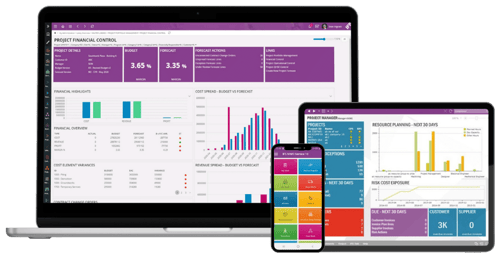IFS vs Infor ERP (CloudSuite): Which ERP is Best?
The enterprise resource planning (ERP) software market is experiencing rapid growth, expected to exceed $78 billion in 2026 according to recent...
10 min read
 Blake Snider
:
Nov 18, 2025 12:00:00 AM
Blake Snider
:
Nov 18, 2025 12:00:00 AM
The decision to invest in a new ERP is all about preparing your manufacturing business for the future. With the global ERP software market on a path to reach an estimated $110.15 billion by 2034, according to Precedence Research, finding the optimal platform is a powerful competitive advantage.
For manufacturing leaders, selecting the right solution means establishing a digital foundation that can unify data, enhance efficiency, and foster sustainable growth. This guide provides a detailed feature-by-feature ERP software comparison of IFS and Infor M3, exploring core functionality, ideal use cases, and strategic considerations to help you make an informed decision for your enterprise.
Picking an ERP means knowing how the top platforms differ. Both IFS and Infor M3 have long histories in the enterprise software space and have evolved from their on-premise roots into sophisticated, cloud-based solutions. While both are powerful, they have been developed with different core competencies in mind.
IFS is a globally recognized ERP software provider with a focused approach on industries that are project management and service-centric. This includes sectors like aerospace, defense, energy, and construction, where managing complex, long-term projects is the core business process. The company's modern IFS Cloud platform offers robust functionality that seamlessly integrates enterprise asset management (EAM) with manufacturing and supply chain operations. In 2025, IFS strengthened its position as an Industrial AI leader through strategic acquisitions that enhance its supply chain and logistics capabilities.
Infor M3, formerly known as Lawson M3, has a deeply ingrained legacy in the process manufacturing and distribution sectors. It is designed to handle the intricate needs of industries such as food and beverage, chemicals, and fashion. The platform now operates as a key component of the broader Infor CloudSuite, leveraging its robust cloud capabilities for enhanced security and scalability. Its continued focus on industries with recipe- and formula-based production sets it apart.
At the heart of any ERP system evaluation is the question of core functionality. While both platforms cover the essentials, their specific strengths in production, inventory, and supply chain management are key differentiators. The right tool for your business depends on whether your manufacturing processes are formula-driven, project-driven, or somewhere in between.
| Criteria | IFS Cloud | Infor M3 |
|---|---|---|
| Best for | Project- and asset-intensive ops; engineer-to-order; long lifecycle assets | Process manufacturing; formula/recipe driven; high-mix distribution |
| Standout modules | Project Mgmt, EAM, FSM, Maintenance Planning | Recipe/Formula Mgmt, Lot/Batch Tracking, Quality, Fashion & F&B suites |
| Typical wins | Complex projects, field service, asset performance | Compliance, traceability, batch yield, co-/by‑products |
| Limitations | Less specialized for deep recipe/grade management | Less native depth for project-centric financials |
This is where the distinction between IFS and Infor M3 is most pronounced. A company’s primary manufacturing mode dictates which platform is the more natural fit. For businesses that are project-driven, such as custom manufacturers of large industrial equipment, the IFS software system offers a powerful and comprehensive project-centric approach. Its integrated EAM and field service management (FSM) modules ensure seamless tracking of assets from manufacturing through their entire operational lifecycle. For example, a company building turbines can manage the entire process, from project bidding to final installation and long-term maintenance, all within the IFS Cloud solution.
In contrast, Infor M3 stands out for process manufacturing businesses, which depend on formulas and recipes. A pharmaceutical company, for instance, can use Infor M3’s granular recipe and formula management tools to ensure compliance and traceability for every batch produced. The system is designed to handle variables like ingredient potency and lot tracking, providing the deep functionality required to manage the unique challenges of industries where the final product is a blend of components rather than an assembly.
| Criteria | IFS Cloud | Infor M3 |
| Planning focus | Top-down, project-centric supply orchestration | Demand-driven, batch-aware replenishment |
| Inventory depth | Good; integrates with EAM/maintenance spares | Advanced multi-dimensional (batch, lot, quality, grade) |
| Global footprint | Strong for multi-site projects and service networks | Strong for multi-plant process manufacturing and 3PL |
| Forecasting | Project/material forecasts | Consumption/attribute-based forecasts |
Effective supply chain management is critical for industrial manufacturing. Both IFS and Infor M3 provide robust modules, but they specialize in different areas. The IFS approach is well-suited for businesses with complex global supply chains that involve managing assets and services alongside physical goods. It provides end-to-end visibility from a top-down, project-centric view.
Infor M3’s strengths lie in its deep inventory management capabilities, which are tailored for process-driven environments. The system excels at multi-dimensional inventory control, allowing users to track stock by location, batch, and quality. This level of granularity is crucial for industries where a single expired batch could lead to a massive recall. The system’s forecasting tools empower businesses to create a demand-driven supply chain, ensuring timely fulfillment and reducing wastage. Tight integration with other business tools improves operational efficiency by eliminating redundant data entry and manual processes.
Customization without Compromising Core Integrity
One of the most significant strengths of IFS is its architecture, which is grounded in a Service-Oriented Architecture (SOA) approach. This offers a slew of benefits:
Non-invasive Customizations: By enabling businesses to implement modifications without delving into the core codebase, IFS ensures that these customizations remain independent. This approach minimizes disruptions during system upgrades and keeps the essential system components untouched, thus preserving stability and reliability.
Upgrade Simplicity: Future upgrades, an inevitable aspect of ERP solutions, become considerably less cumbersome. As customizations are layered atop the core without altering it, system updates can seamlessly integrate without negating or conflicting with the custom features.
Harnessing the Power of Out-of-the-box Configuration
While Infor M3’s approach differs slightly, its strength lies in the breadth of configuration options it provides. The Variant Configurator tool stands out in this regard:
Tailored Configurations: With the Variant Configurator, M3 offers a broad spectrum of configuration choices. Whether it's adapting to specific industry nuances or catering to unique organizational demands, M3 provides tools that can be precisely tailored.
Balancing Flexibility with Complexity: While the vastness of configuration options provides businesses the flexibility to mirror their processes closely, it also brings forth a nuanced challenge. The implementation phase for M3 tends to be intricate due to the plethora of choices. Thus, proper planning, clear business process mapping, and expert guidance during the setup phase can ensure that the system aligns perfectly with the organization's needs.
Key Takeaway: IFS allows for customization without meddling with the core, ensuring easy upgrades in the future. Infor M3, on the other hand, offers extensive configuration options but requires a more intricate implementation process. Your decision hinges on balancing immediate customization needs with long-term system evolution and maintenance.
The true value of an ERP solution is its ability to adapt to a company’s unique business requirements. A head-to-head ERP software system comparison must account for how each platform handles customization, integration, and the broader technology stack. As of 2025, both IFS and Infor M3 have made significant strides in adopting modern, flexible architectures that support the changing needs of the market.
| Criteria | IFS Cloud | Infor M3 |
| Integration stack | Open APIs, SOA; non-invasive extensions | Infor OS platform, ION, prebuilt CloudSuite connectors |
| Common connects | CRM, EAM, PLM, field service apps | WMS, PLM, EDI, CPQ, commerce |
| Extensibility | Layered customizations survive upgrades | Configurable flows via Infor OS; app studio options |
Modern ERP platforms must function as central hubs that seamlessly connect to other systems. Both IFS and Infor M3 have embraced this need for interoperability. The IFS Cloud platform is built on a Service-Oriented Architecture (SOA) that uses open APIs for non-invasive integration. This means businesses can connect third-party applications like CRM systems, business intelligence platforms, and external supply chain tools without altering the core system code.
Similarly, Infor M3 integrates within the broader Infor CloudSuite, leveraging the Infor OS platform to provide a unified user experience and a suite of complementary software solutions. The system offers powerful, pre-built tools for integrating with other enterprise applications, ensuring a cohesive and functional technology stack. The ability to integrate with third-party systems is a major benefit, as it reduces the need for costly custom development and ensures a unified source of truth.
| Criteria | IFS Cloud | Infor M3 |
| Custom approach | Layered, metadata-driven; upgrade-friendly | Variant Configurator; CloudSuite extensions |
| Implementation style | Phased by project/asset lifecycle | Phased by product lines, plants, recipes |
| Change risk | Lower for layered customizations | Requires strong testing with bi-annual releases |
The path from software selection to go-live is defined by the implementation process. IFS allows for a high degree of customization through its non-invasive architecture. This approach, where customizations are layered on top of the core platform, simplifies future upgrades. It enables manufacturers to tailor the system to their specific needs without creating a complex, code-heavy setup that could complicate future migrations. A business, for instance, could create a custom workflow for quality control that is unique to their products, and this customization would remain intact when a new version of IFS Cloud is released.
The Infor M3 approach relies on a powerful Variant Configurator that enables deep configuration and process-specific tailoring. This tool is a key feature for companies that need to manage highly configurable products. As reported in 2025, Infor's bi-annual feature releases can impact custom setups, underscoring the importance of a clear testing and change management strategy during the implementation process. Infor M3’s configuration mastery allows a business to define an almost infinite number of product variations without writing a single line of code.
In a competitive market, a user-friendly interface and the ability to leverage data are non-negotiable. Both systems have invested in modernizing their platforms, with a growing emphasis on AI and predictive analytics to drive business processes.

A well-designed ERP system improves adoption and productivity. IFS Cloud offers a modern, high-density user interface that provides a comprehensive view of complex operations at a glance. It also includes intuitive, role-based interfaces that show users only the information they need to perform their tasks, preventing data overload. This design is also reflected in its robust mobile experience, which ensures key information and workflows are accessible on any device.
| Criteria | IFS Cloud | Infor M3 |
| UI style | High-density, role-based workspaces | Infor OS dashboards; focused, task-driven screens |
| Mobile | Robust mobile for service/field roles | Mobile via Infor OS; role-focused apps |
| Adoption aids | Guided tasks, asset/project views | Context apps, simplified views for casual users |
The user experience on Infor M3 is delivered through the Infor OS platform, which organizes data into focused dashboards and screens. This modular approach is designed to be more accessible for casual users who may be intimidated by a single, comprehensive screen. The platform’s modern look and feel, combined with its focused data presentation, helps users get the information they need quickly and efficiently.
| Criteria | IFS Cloud | Infor M3 |
| Data strengths | Asset, project, service KPIs integrated | Batch/lot genealogy, process KPIs |
| AI/ML focus | Predictive maintenance, schedule optimization | Demand planning, quality, yield prediction |
| Reporting | EAM/Project dashboards; embedded analytics | Infor Birst/OS analytics; recipe & batch insights |
Both IFS and Infor M3 are more than just transaction systems. In 2025, both leverage AI and machine learning to provide deeper business intelligence. AI features in modern ERP can deliver meaningful efficiency gains. AI can automate data entry, provide real-time insights, and enable proactive maintenance. A manufacturing company can use AI in its ERP system to predict machine failure before it occurs, a process that can save hundreds of thousands of dollars in unscheduled downtime.
For IFS, the analytics are tightly integrated with its core modules, providing analytics on EAM, project performance, and supply chain health. For Infor M3, the data management is optimized for batch-based environments, providing granular reporting on everything from ingredient lot numbers to production cycle times. The ability to get real-time data from a single source of truth eliminates the inefficiencies of using manual processes or disparate systems.
The ERP software comparison is incomplete without a look at the total cost of ownership. The 2025 cost picture for a new ERP solution goes beyond the initial license fee and includes a range of ancillary expenses.
| Cost Area | IFS Cloud | Infor M3 |
| Licensing | User-based subscriptions | User-based subscriptions |
| Implementation | Project/EAM heavy setups can raise services | Process/config depth can raise services |
| Upgrades | Cloud cadence; layered customizations ease | Cloud cadence; test configs with releases |
| TCO drivers | Assets, field service, integrations | Recipes, compliance, multi-plant scope |
Both IFS and Infor M3 offer flexible, cloud-based pricing models. Both systems use a user-centric subscription approach, which provides transparent and predictable costs. While this simplifies budgeting, it’s important to remember that implementation costs, including professional services, data migration, and training, can be substantial. For large-scale projects, these costs can often be equal to or greater than the software license fees. Companies should also factor in the cost of ongoing maintenance and upgrades, which are necessary to ensure the software system remains secure and up-to-date.
| Criteria | IFS Cloud | Infor M3 |
| Scale profile | Global, asset/project networks | Global, process plants/distribution |
| Expansion | Strong for new service lines and regions | Strong for new plants, brands, co-packers |
| Multi-company | Solid intercompany for asset-centric models | Strong intercompany for process/manufacturing |
A modern ERP system is a long-term investment that must be able to scale with your business. The modular architecture of IFS allows for easy expansion into new regions or verticals. The IFS Cloud platform is built to support vast, global deployments, ensuring that the technology can keep pace with a company’s business growth. Similarly, Infor M3’s architecture is designed for growth, with a modular design that enables businesses to add users, locations, and functionalities as needed without compromising system performance. This ensures that the chosen ERP solution is not just a tool for today, but a foundation for the future.
Both IFS and Infor M3 are world-class ERP platforms that can deliver immense value to mid-sized and large manufacturing companies. The final decision is not about finding a single "better" solution, but about choosing the one that best aligns with your company's core operational needs and strategic goals.
Choose IFS Cloud if you check ≥3:
Choose Infor M3 if you check ≥3:
Shortlist both and test:
In 2026, the battleground has shifted to Artificial Intelligence. IFS Cloud has integrated "Industrial AI" deep into its core, offering predictive maintenance and scheduling automation specifically for asset-intensive industries like utilities and aerospace.
Infor M3, meanwhile, leverages its "Coleman AI" and Industry Cloud Platform primarily for supply chain optimization and distribution efficiency. If your priority is preventing equipment downtime, IFS often holds the edge. If your focus is high-volume retail distribution, Infor’s AI tools are highly competitive.
For a direct look at user sentiment, check the G2 user reviews comparing these two platforms side-by-side.
A durable ERP roadmap starts with cloud‑first design, clean integrations, and clear ownership. For shop‑floor speed, add edge data capture where it helps. Use AI where it is proven: IFS Cloud for asset health and service scheduling; Infor M3 for demand, quality, and yield in process manufacturing. Build in sustainability reporting early—lot/batch traceability, energy use, and waste reduction are now audit items.
Next steps (practical):
Manufacturers work with Astra Canyon for selection, design, and delivery—not just software setup. Our team has decades in plant‑floor operations and leadership roles. We’ve helped organizations modernize platforms, improve integration, and prove ROI.
Companies such as Kodiak, PowerSecure, Barnhart, ESG, and HCR have partnered with us. In one example, Nomad Global Communication Solutions replaced legacy systems with a modern ERP backbone, unifying operations and improving compliance.
Want more context on platforms and partners? See our top ERP systems for manufacturing guide.
Ready to move on to IFS Cloud? Book an IFS ERP demo with Astra Canyon today. You’ll see a live IFS ERP demo, a project‑costing walkthrough, and a pilot plan with fit score and TCO assumptions. We align IFS Cloud to your goals, map integrations (CRM, PLM, WMS/EDI), choose the right deployment, train your team for go‑live, and provide ongoing support.
Recognized excellence: IFS was named ERP Vendor of the Year at the 2022 ERP Today Awards.

The enterprise resource planning (ERP) software market is experiencing rapid growth, expected to exceed $78 billion in 2026 according to recent...

Modern enterprises cannot afford process delay, redundant data entry, or fragmented systems. Automation inside an enterprise resource planning (ERP)...

Enterprise resource planning (ERP) systems are a crucial component of modern business operations, providing a single platform for managing various...